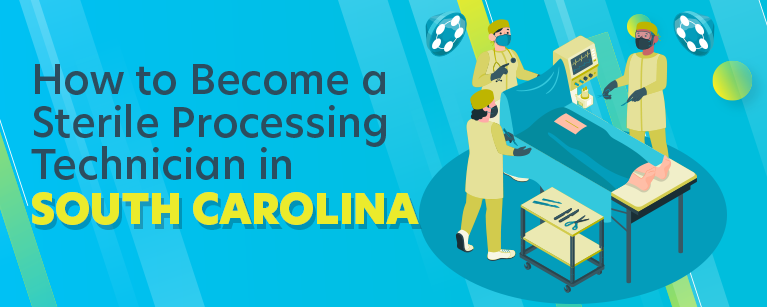
Embarking on a profession as a Sterile Processing Technician in South Carolina isn’t just about securing some work; it’s tied in with ensuring the well-being and safety of patients across the state.
These overlooked yet truly great individuals in the healthcare industry hold an important role in the clinical field, sterilizing equipment to forestall infections and maintain the best expectations of care.
If you have a sharp eye for detail and an enthusiasm for healthcare, read on to discover how this essential position can be within your scope.
Table of Contents
How to Become a Sterile Processing Technician in South Carolina: A Comprehensive Guide
To become a Sterile Processing Technician (SPT) in South Carolina, it’s important to understand the basics of the role.
These technicians are crucial in preventing infections by carefully cleaning, checking, packaging, and sterilizing medical instruments.
Your journey starts with gaining your GED, your first step.
Then, exploring the educational institutions in South Carolina that offer specialized programs to meet the state’s requirements and increase your chances of finding a job in the competitive healthcare field is crucial.
Enrollment in an Accredited Program:
Your next step is enrolling in an accredited Sterile Processing Technician program.
- Accreditation guarantees the excellence of education and its conformity with industry norms.
- In South Carolina, programs recognized by CAAHEP or IAHCSMM establish the standard. These programs equip you with theoretical and practical knowledge to excel in this field. A solid grasp of microbiology, surgical instruments, infection control, and sterilization technologies is crucial, as they are all part of the curriculum. Mastering these subjects is vital for your future profession.
Practical Experience: Apprenticeships:
- Apprenticeships provide a seamless transition from academic training to full-time employment for aspiring Technicians in South Carolina.
- Apprenticeships combine hands-on workplace training with continued classroom learning to equip students with practical skills and real-world experience.
- Apprenticeships in healthcare facilities in South Carolina offer a unique glimpse into your daily responsibilities.
- Candidates can find apprenticeships by contacting local hospitals, outpatient surgery centers, and clinics or utilizing resources like the South Carolina Department of Labor, Licensing and Regulation.
- Participating in an apprenticeship helps build a professional network in the healthcare industry and ensures alignment with state regulations and standards for sterile processing.
Certification:
Certification is pivotal in establishing credibility and enhancing your career prospects as a Sterile Processing technician in South Carolina.
Here’s a look at the certification process:
Understanding the Importance of Certification:
- Professional Recognition: Certification is a testament to your knowledge, skills, and dedication to the field. Employers across South Carolina recognize it and can significantly improve job prospects.
- Quality Assurance: Being certified means you have met industry-standard competencies in sterile processing, reassuring employers of your ability to maintain a high standard of infection control.
- Enhanced Career Opportunities: Certified technicians often have access to a broader range of job opportunities, including positions at more extensive medical facilities and specialized surgical centers.
Popular Certification Options:
- Certified Registered Central Service Technician (CRCST): Offered by the International Association of Healthcare Central Service Materiel Management (IAHCSMM), this certification requires completing an accredited program and passing an examination.
- Certified Sterile Processing and Distribution Technician (CSPDT): Administered by the Certification Board for Sterile Processing and Distribution (CBSPD), this certification also demands successful program completion and passing a comprehensive exam.
Maintaining Certification:
- Renewal Requirements: CRCST and CSPDT require periodic renewal, typically yearly, which involves completing a certain number of CEUs.
Benefits of Dual Certification:
- Increased Marketability: Holding more than one certification can make you more attractive to employers, showcasing a broader skill set and versatility in sterile processing.
- Professional Development: Pursuing multiple certifications can contribute to your professional growth and knowledge base, making you a more well-rounded technician.
Sterile Processing Technician Schools in South Carolina:
When exploring the educational options available in South Carolina, you can discover diverse programs designed for individuals pursuing a career as Sterile Processing Technicians.
Midlands Technical College:
- This college offers a certificate program in Sterile Processing.
- The course time is over several months.
- The cost is approximately $2,400.
- Combines classroom instruction with practical experience.
- Prepares graduates for immediate employment and certification exams.
Aiken Technical College:
- This college Provides extensive training in sterilization processes.
- The duration of the course is five semesters.
- The cost of the program is roughly $2000
- Coursework is provided to prepare students for certification exams and employment in healthcare facilities.
Florence-Darlington Technical College:
- Here, they offer a comprehensive course in Sterile Processing.
- Duration: Four semesters.
- Cost: Around $1,500.
- The program includes in-depth training, covering all necessary competencies, with clinical experiences at local healthcare providers.
Spartanburg Community College:
- The college provides an in-depth Sterile Processing Technician program.
- Cost: About $1,000.
- The course focuses on hands-on training, ensuring students are well-prepared for the realities of the job in various medical settings.
| School Name | Address |
|---|---|
| Midlands Technical College | 151 Powell Rd, Columbia, SC 29203, United States |
| Aiken Technical College | 2276 Jefferson Davis Hwy, Graniteville, SC 29829, United States |
| Florence-Darlington Technical College | 2715 W Lucas St, Florence, SC 29501, United States |
| Spartanburg Community College | 107 Community College Drive, Spartanburg, SC 29303, United States |
Salary for Sterile Processing Technicians in South Carolina:
In South Carolina, Sterile Processing Technicians’ compensation is competitive within the allied health professions.
The average annual salary for a Sterile Processing Technician in the state is around $35,190.
The overall demand for healthcare services in South Carolina also affects the salary potential, increasing the need for qualified technicians.
The financial reward of this career is accompanied by the intangible benefits of contributing to patient care and safety.
As you consider a career as a Sterile Processing Technician in South Carolina, it’s encouraging to note that with dedication and development of expertise, your financial and professional growth prospects are promising.
Annual Salary Range:| Location | Avg. Annual Salary |
|---|---|
| Columbia | $41,997 |
| Charleston | $43,039 |
| North Charleston | $43,039 |
| Greenville | $42,825 |
| Rock Hill | $44,610 |
| Mount Pleasant | $43,039 |
| Spartanburg | $42,598 |
| Sumter | $40,527 |
| Hilton Head Island | $42,312 |
| Florence | $40,853 |
Regional Salary in South Carolina
| Region | Employed | Avg. Annual Salary | Avg. Hourly Pay | Top 10% Annual Salary | Bottom 10% Annual Salary |
|---|---|---|---|---|---|
| Charleston-North Charleston, SC | 330 | $42,570 | $20.47 | $48,010 | $31,650 |
| Columbia, SC | 250 | $41,340 | $19.88 | $52,800 | $29,970 |
| Florence, SC | 160 | $32,920 | $15.83 | $38,530 | $28,730 |
| Greenville-Anderson-Mauldin, SC | 240 | $43,360 | $20.85 | $54,780 | $35,200 |
| Myrtle Beach-Conway-North Myrtle Beach, SC-NC | 50 | $41,330 | $19.87 | $52,620 | $34,080 |
| Spartanburg, SC | 90 | $43,400 | $20.87 | $59,600 | $36,930 |
* Employment conditions in your area may vary.
Frequently Asked Questions
Is certification mandatory in South Carolina?
While not lawfully needed, most businesses lean toward certified technicians, making it a valid norm.
How long is the certification valid?
Certification typically lasts for one year, requiring annual continuing education for renewal.
Can I advance my career in this field?
Yes, with experience and additional certifications, there are opportunities for advancement into supervisory roles or specialized areas of sterile processing.
Sterile Processing Technician Info by State
- Alabama
- Alaska
- Arizona
- Arkansas
- California
- Colorado
- Connecticut
- Delaware
- Florida
- Georgia
- Hawaii
- Idaho
- Illinois
- Indiana
- Iowa
- Kansas
- Kentucky
- Louisiana
- Maine
- Maryland
- Massachusetts
- Michigan
- Minnesota
- Mississippi
- Missouri
- Montana
- Nebraska
- Nevada
- New Hampshire
- New Jersey
- New Mexico
- New York
- North Carolina
- North Dakota
- Ohio
- Oklahoma
- Oregon
- Pennsylvania
- Rhode Island
- South Carolina
- South Dakota
- Tennessee
- Texas
- Utah
- Vermont
- Virginia
- Washington
- West Virginia
- Wisconsin
- Wyoming









